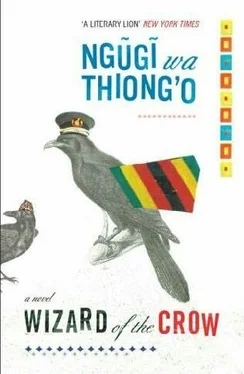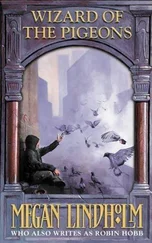“I am looking forward to the guided tour. But don’t lawyer for the natives-let them lie for themselves,” Nyawlra said.
“Let’s make a plan for the first day: what would you like to see?”
“Wherever you take me I shall follow and say it is good,” she said.
Throughout the day they never talked about the Tajirikas, or the Wizard of the Crow, or even Kamltl’s abrupt departure from Santalu-cia and his adoption of the wild. It was as if they had made a secret pact not to let recent events in Eldares intrude on their communion with each other and nature. They felt good and at peace amid nature’s bounty.
They were like-minded about so many things. They often punctuated their talk with songs, stories, and friendly banter, such as when they came across a zebra rat and then a field mouse. They stopped and in unison sang about the animals.
Zebra rat
And field mouse
Once went to
A granary
Of an in-low
To feed
And out came
Nine goats
Of youth
To turn ten
It was a song that helped them count up to ten, but the logic was in the rhythm instead of the meaning of the words. Once again they laughed together, and as they looked in each other’s eyes they were suddenly without words. They resumed their walk in silence, taken up by the light they saw in each other’s eyes.
Love was everywhere: in the tree branches where the nests of weaverbirds hung; in the fern where the widowbird had left two long black tail feathers; in the murmurings of the Eldares River as it flowed eastward before turning into a roaring waterfall; in the sun’s rays, which pierced through the waterfall, splitting into the seven colors of the rainbow; in the still waters of a small lake made by the river where Kamltl and Nyawlra now swam and bathed and chased each other, splashing water on each other; in the blackjacks, the goose-grass and other plants, the flowers and seeds of which stuck to their wet clothes; in the movement of porcupines and hedgehogs; in the wings of the helmeted and crested guinea fowls, francolins that scampered away after stealing glances at the couple; in the honeybees and butterflies hopping from flower to flower; in the cooing of the doves; in the mating calls of the river frogs from among the reeds and water lilies. Love was there among the creeping plants that twined around the tree trunks; yes, in the blackberries, some of which they plucked and fed to each other. Love was there in the breeze that made the leaves sway ever so gently. Love was everywhere in this forest, but neither Nyawlra nor Kamltl mentioned the word.
Later, seated on the ground, leaning against the trunk of a sycamore tree, they sipped cocoa, sometimes in silence, each lost in a world of his or her making, thinking the same thoughts and now and then indulging in small talk. Love had followed them here as moonlight illuminated the leaves to form patterns of light and shadow on the ground and their bodies. Yet still they could not pronounce love to each other or even silently to themselves.
But they felt enveloped in peace beyond understanding, peace emanating from the forest even though the crickets were calling and hyenas were howling from afar, and when Kamltl and Nyawlra looked at each other, their eye beams pulled them together, Kamltl’s fingers straying to Nyawlra’s nipples, the color of blackberries.
They slid into wordless wonder, and even on waking up in the morning they were still firmly locked in each other’s arms as if they would never ever part.
However, by the late afternoon a chill had grown between them, not because their disposition toward each other had changed but because they had put many issues on hold, issues that could no longer be ignored.
Kamltl tried to answer questions that must have been bothering Nyawlra; the letter he had left behind for her had been cryptic.
“Not that I knew what prompted me to turn my back on healing, divination, and the money, to embrace the life of a hermit in the wilderness,” Kamltl struggled to explain.
He spoke in an even tone, neither high nor low, neither sad nor joyful, a little introspective, perhaps, as if in addressing Nyawlra he was holding a dialogue with himself.
“Maybe there were many reasons; maybe there was only one; the truth is that nothing is very clear in my mind. I did not choose to play at being the Wizard of the Crow. I was thrust into it. You know how this whole business began. What was his name-I mean the police officer who chased us across the prairie that night? Arigaigai Gathere. A.G. What a name! Arigaigai! Had you ever come across such a name before? It was A.G. who set me on the road to sorcery. My own troubles made me all too willing. At first I thought that I was merely playing a role, briefly. I was proud that I never once dispensed magic that could harm anyone; and I never really lied to my clients. I never employed conjuring tricks to mesmerize. I worked with thoughts and images already in their own minds. But still I pretended to be what I was not. Did I not heal under falsehood? Imagine going to a doctor only to learn afterward that he has no training in his craft, no license to practice? I was a quack of a wizard. But that is beside the point. My divinations were an appetite for evil. Take Tajirika and his ilk; did I not breathe new life into him, increasing his self-confidence in doing evil? Protected by magic as he now imagines himself to be, is he not now free to rob with impunity? Did my divination not facilitate his thievery? I was an accessory to the very evil that revolted me.
“Maybe at the very beginning I harbored the illusion that there might come to me one or two who would be bold enough to see the error of their ways and say, I have a blemish, help me remove it. This might have given my role some worth. But no, they were all driven by greed and hatred.
“They were interested in only two things: to be empowered and to cripple their rivals. Yes, when it came to greed, they were clones of one another. Their greed stank. Even as I asked them questions about their afflictions, the smell of evil and greed oozed out of their every pore and made it difficult for me to breathe. For a time I was able to endure the ooze by sniffing the scent of flowers that you always left behind. But Tajirika’s rot proved more terrible than any that I had experienced before: a black man celebrating the negation of himself. This final blast of foul air was unbearable.
“I don’t know where I got the strength to do it, but I eventually did find myself outside the door, and still the foulness pursued me. I panicked. Whenever I had gone out into the open I had been able to rid myself of their stench and breathe fresh air. This was now not the case. I collapsed. When later I came to my senses I felt that I did not want to go back to the shrine, but I managed to force myself into the house to write you the letter. By then I had already made up my mind.’’
“To do what?” Nyawlra asked.
“Flee Eldares. Abandon human community for the wilderness.”
“In your letter, what did you mean by the words I am going to find myself?” Nyawlra quizzed him.
“I don’t want to say that at the time of writing the letter I was in a position to convey all my thoughts in words. Say I just wanted to escape the stink. I told you that when I went outside the house I felt that the rot had followed me and as if it were now oozing through my clothes, my body, me, and I had never felt like that before. I asked myself: If I start stinking like them, what will be the difference between them and me?”
“And the rot that you talk about so movingly-what do you suppose will bring it to an end?”
“The affairs of the people are too heavy a burden for me to carry”
Читать дальше












